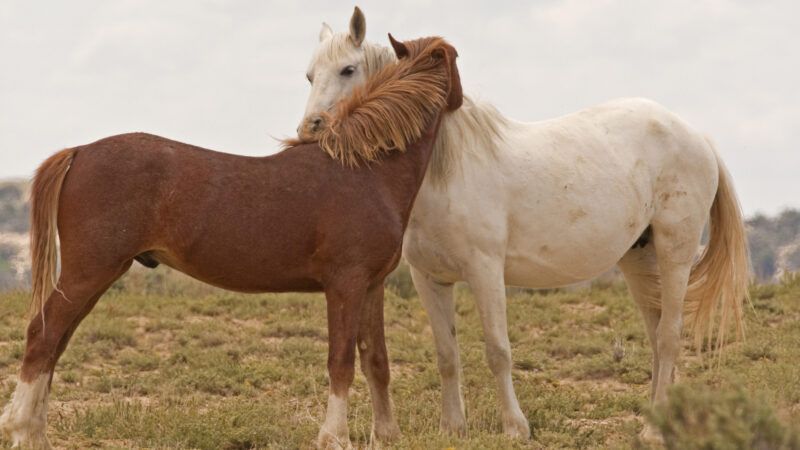Predictably, Wild Horses Are Still Suffering Due to Federal Slaughter Ban
Turns out that basing animal rights policy on the strong feelings of animal rights activists is not working out so well for the animals themselves.

A federal Bureau of Land Management (BLM) program designed to send wild horses to happy forever homes is instead sending those horses to buyers who fail to care for them adequately and often resell them for a profit at slaughter auctions, The New York Times reported this week.
"The Bureau of Land Management, which is in charge of caring for the nation's wild horses, created the $1,000-a-head Adoption Incentive Program in 2019 because it wanted to move a huge surplus of mustangs and burros out of government corrals and find them 'good homes," the Times reported. "But records show that instead of going to good homes, truckloads of horses were dumped at slaughter auctions as soon as their adopters got the federal money."
Critics claim BLM is aware that the horses it sells often end up at slaughterhouses. The reasons why are quite simple. "It's economics," one rancher told the Times. "I can make about $800 putting a calf on my land for a year. With the horses, I made $1,000, then turned around and sold them for $500."
As the Times details, after wild horse numbers plummeted decades ago, Congress moved to protect them in the 1970s. Their numbers rebounded so profoundly that there are now far too many wild horses. The result? BLM is now holding tens of thousands of unwanted, captured wild horses, which eat up most of the program's $60 million budget.
While BLM leaders want to cull their numbers, the Times reports, "they have always been blocked by lawmakers mindful that a vast majority of voters do not want symbols of their heritage turned into cuts of meat."
Indeed, horse lovers who oppose slaughter claim chiefly that most Americans don't want horses to be slaughtered and that horses have significant cultural and historical value. It's an argument based almost entirely on emotion.
But prohibiting horse slaughter has terrible unintended consequences for the welfare of these animals. We know this because the USDA has, for more than a decade, banned horse slaughter in this country.
As I noted in 2011, U.S. horses intended for slaughter are now traveling significantly greater distances to reach their final destination, where they are not covered by U.S. humane slaughter regulations. In 2013, I applauded the USDA for lifting its seven-year moratorium on horse slaughter in this country. In that column, I cited research that had correctly predicted the slaughter ban would result in "a large number of abandoned or unwanted horses" and "a rise in investigations for horse neglect." I also noted that respected animal welfare experts, such as Temple Grandin, and famed chefs, such as Andrew Zimmern, supported lifting the slaughter ban.
But, as I predicted in 2014, the ban stuck, thanks to pressure from animal-rights groups. Predictably, too, the animal welfare problems the ban causes only worsened.
The ban is as unethical as it is nonsensical. If laws forced Americans to continue to raise cattle until the cows died of natural causes, we'd be overrun by starving cattle.
The U.S. is an outlier when it comes to horse meat. People around the world eat horses. Grocers in the United Kingdom and Canada and elsewhere and restaurants in dozens of other countries sell it. While most Americans don't eat horses, that's true in large part because real horse meat can be difficult or impossible to track down here.
In a 2007 piece, Time writer Joel Stein noted opposition to eating horse meat, then brushed it off. "I decided not to let a bunch of horse freaks…prevent me from eating meat enjoyed in Japan, Belgium, France, Italy, Sweden, the Netherlands, Germany and Austria," Stein wrote. Then he tucked into some Canadian horse meat. "It turned out to be pretty awesome—a sweet, rich, superlean, oddly soft meat, closer to beef than venison.
If eating horses is good for the taste buds, it may also be the best thing for the welfare of these animals. "An overabundance of wild horses in the American west is driving us to the brink of an environmental disaster—and the most sensible solution may be adding them to the menu," Caty Enders wrote in a 2015 piece in The Guardian.
But don't hold your breath. Despite the tragic animal welfare consequences of the federal horse-slaughter ban, Congress is considering a move to make the slaughter ban—which must be renewed every year—permanent. Food Safety News reports the permanent ban, which has yet to be introduced in the current Congress, would likely ban domestic and foreign sales of horses for human consumption. The export ban alone would add tens of thousands of superfluous horses to the glut of unwanted horses already in the United States.
The USDA, for its part, has noted horse slaughter is "understandably a sensitive and emotional one for everyone who loves these majestic animals."
I'd rather a horse be slaughtered humanely in a domestic facility and turned into food than be left to starve or be trucked hundreds or thousands of miles to be slaughtered abroad. Anyone who truly loves horses should agree.

Show Comments (157)